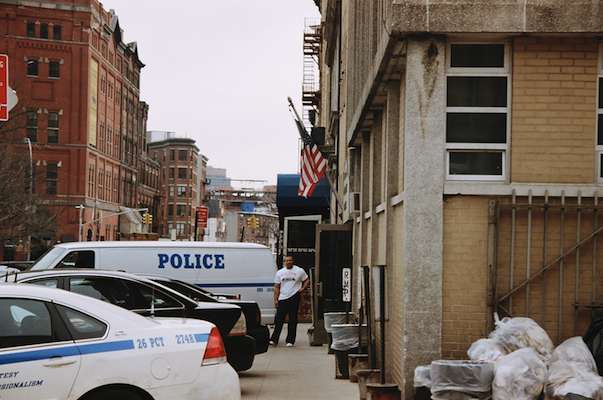On the Series Photographs Published for West Street Gallery, 2010

My subjects hang out in front of a police precinct near my studio. I suspect they are off duty or undercover police officers. Most of them are. My subjects are conspicuously inconspicuous so in a manner of speaking when I see something I shoot something casually and spontaneously on my way to get coffee.
These photographs are successful precisely in their lack of power and purpose. The photographs are unsympathetic and undirected. At times the photographs aspire to the look of surveillance, but as a tool for what?
Undercover cops have come down to your level, wandering, in order to tempt you. The word ‘Satan’, and the Arabic “shaitan”, may derive from a Northwest Semitic root śṭn, meaning “to be hostile”, “to accuse.” An alternative explanation is provided by the Hebrew in Job 1:7. When God asks him from where he has came, Satan answers: “From wandering (mi’ŝuṭ) the earth and walking on it”. The root ŝuṭ signifies wandering on foot or sailing. ‘Satan’ is “the Wanderer”. In I See Satan Fall Like Lightning, Réne Girdard discusses “Satan” as a principal necessary for creating both order and disorder, creating societal unity through providing scapegoats society can judge as absolute evil without fear of retribution.
Federal agents playing terrorist have convinced and assisted young men, such as “The Newburgh Four” and more recently “The Christmas Tree Bomber”, to carry out murderous plots, only to later arrest them for following their suggestions. Agents may be amongst you, but they are not like you for they have the power to judge and execute. In playing dress-up as civilians, they insist on the superiority of the status they otherwise occupy as “non-citizens” – agents of power. They may be walking on the same concrete streets, but they move in unmarked cars, undercover taxi cabs, and street clothes, the guns strapped to their legs and chest allow them to rise over you at any time. Now we have been invited to do the same.
In a video to be displayed on monitors in Wal-Marts around the country, the United States Secretary of Homeland Security Janet Napolitano tells shoppers to spy on their neighbors – echoing the familiar refrain New Yorkers hear on the subway, “If you see something, say something”. We are all asked to play cop, but to give the power to the state- you are to “say something” to a police officer, or even a Wal-Mart manager. Through becoming an accuser for the state, you can temporarily transcend from your status as citizen. The image of unity is paradoxically created in mutual suspicion. The disjunction created between individuals when they are spying on each other makes each subject feel a part of the state by doing the state’s work. The individual becomes a subject of the state divorced from his responsibility to his fellow citizen. As the difference between the plain clothed officer and the shopper of plain clothes disintegrates, the less people recoil at the violence of the police. The state makes you comply and participate, all in the service of protecting not the values of individuals but the government’s livelihood. To summarize the main point of Hobbes’ Leviathan, the state is armed.
In taking these photographs, am I following the suggestions of Ms. Napolitano? Why are those four men gathered together comparing notes on the corner? That man is forcing another into a car. Is he kidnapping him? That car looked like it could be carrying a bomb. Why else would its windows be blacked out?